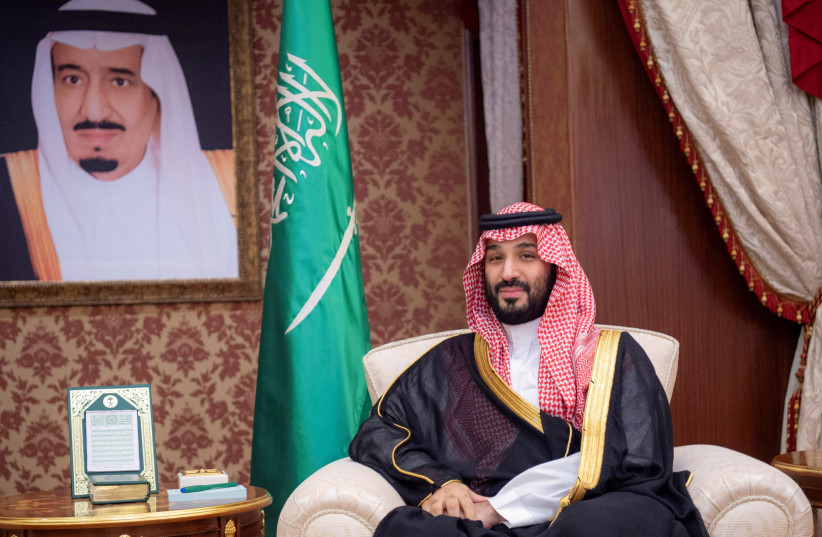Saudi Arabian Crown Prince Mohammed bin Salman said in a US television interview that his country was moving steadily closer to normalizing relations with Israel and also warned that if Iran gets a nuclear weapon, "we have to get one."
"Every day we get closer," the crown prince told Fox News in wide-ranging remarks broadcast on Wednesday, when asked to characterize talks aimed at long-time foes Israel and Saudi Arabia reaching a landmark agreement to open diplomatic relations.
The conservative US network's interview with the crown prince, widely known as MbS, comes as President Joe Biden's administration presses ahead with an effort to broker historic ties between the two regional powerhouses, Washington's top Middle East allies.
Israel-Saudi normalization possible by early 2024
On Thursday, Israeli Foreign Minister Eli Cohen said on Army Radio that a deal could be in place early next year.

"The gaps can be bridged. It will take time. But there is progress," Cohen said. "I think there is certainly a likelihood that, in the first quarter of 2024, four or five months hence, we will be able to be at a point where the details (of a deal) are finalized."
The normalization talks are the centerpiece of complex negotiations that also include discussions of US security guarantees and civilian nuclear help that Riyadh has sought, as well as possible Israeli concessions to the Palestinians.
"For us, the Palestinian issue is very important. We need to solve that part," MbS, Saudi Arabia's de facto ruler, said when asked what it would take to get a normalization agreement. "And we have a good negotiations strategy til now."
"We got to see where we go. We hope that will reach a place that will ease the life of the Palestinians and get Israel as a player in the Middle East," he said, speaking in English.
MbS also voiced concern about the possibility that Iran, a mutual adversary of Saudi Arabia and Israel that the US wants to contain, could obtain a nuclear weapon. Tehran has denied seeking a nuclear bomb.
"That's a bad move," he said. "If you use it, you got to have a big fight with the rest of the world."
Asked what would happen if Iran did get a nuclear bomb, MbS said: "If they get one, we have to get one, for security reasons and the balance of power in the Middle East. But we don't want to see that."
Potential benefits of mega-deal
While US officials insist any breakthrough is far away and steep obstacles remain, they privately tout the potential benefits of a regional mega-deal.
These include removing a possible flashpoint in the Arab-Israeli conflict, strengthening the bulwark against Iran and countering China's inroads in the Gulf. Biden would also score a foreign policy win as he seeks re-election in November 2024.
The broadcast of the crown prince's pre-taped comments came on the same day as a long-waited meeting between Biden and Israeli Prime Minister Benjamin Netanyahu in which they pledged to work together toward Israeli-Saudi normalization, which could reshape the geopolitics of the Middle East.
Both leaders also said Iran could not be allowed to acquire a nuclear weapon.
MbS issued the stark warning to Tehran despite the two countries having agreed in Chinese-brokered talks in March to restore relations after years of hostility.
But he offered an olive branch to Iran, saying the two countries had made a "good start" and he hoped it would continue.
Facing criticism from the US, MbS, whose country is the world's top oil exporter, also defended OPEC+'s decision to cut oil output, saying it was based on market stability and not intended to help energy-dependent Russia in its war in Ukraine.
MbS, asked about Russia's military campaign, said the invasion of another country was "really bad" but he appeared to stick to his position of not taking sides in the war.
Among the challenges the US faces in brokering a wide-ranging deal would be satisfying MbS's demands. He is reported to be seeking a treaty committing the US to defend the kingdom if attacked, and also wants advanced weapons and assistance for a civilian nuclear program.
From the Israelis, MbS is pushing for significant concessions to the Palestinians to keep alive prospects for statehood in the occupied territories, something Biden is also pushing for but which Netanyahu's far-right government has shown little willingness to grant.
There is a growing a sense of urgency in Washington over China's effort to gain a strategic foothold in Saudi Arabia. The administration also seeks to further heal ties with Riyadh, which Biden once vowed to make a "pariah."
But an upgraded US-Saudi security relationship would face resistance in the US Congress, where many are critical of MbS over the 2018 killing of journalist Jamal Khashoggi, Riyadh's intervention in Yemen and its role in high oil prices.
Asked about Khashoggi's killing, MbS said he was reforming the kingdom's security system to make sure this kind of "mistake" does not happen again.
Iran stands against the normalization of ties
Iranian President Ibrahim Raisi condemned the possibility of Saudi-Israeli normalization in a press conference in New York on September 21, according to Israeli media reports.
"Normalization between Israel and Saudi Arabia would be a stab in the back of the Palestinians," Raisi said.
Jerusalem Post Staff contributed to this report.
